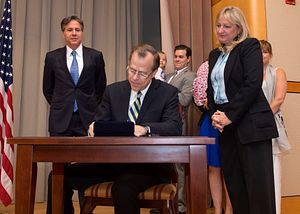The new United States ambassador to Thailand is under investigation for royal defamation over comments he made last month criticizing long and tough jail sentences resulting from the kingdom’s lese majeste law, media outlets reported Wednesday.
According to Section 112 of Thailand’s criminal code, anyone convicted of defaming, insulting or threatening the king, queen, heir or regent faces up to 15 years in prison on each count – one of the strictest punishments in the world for such an offense. While the law has long been criticized for being used to target political enemies of the state, prosecutions have surged and sentences have increased since the junta took power last May following a coup.
On November 25, Glyn Davies, who had just taken up his post nine weeks earlier, had raised concerns about the lese majeste law in a speech at the Foreign Correspondents’ Club of Thailand (FCCT).
“We are also concerned by the lengthy and unprecedented prison sentences handed down by Thai military courts against civilians for violating the lese majeste law,” he told a sell-out crowd at the FCCT event.
“We believe no one should be jailed for peacefully expressing their views and we strongly support the ability of individuals and independent organizations to research and to report on important issues without fear of retaliation.”
Nonetheless, Davies appears to be under investigation for his comments. FCCT president Jonathan Head confirmed that the club had been asked by the Thai police to assist with the probe.
In addition, Thai police also confirmed to The Straits Times than an official investigation was taking place.
“He has not been charged yet by the Thai authority since we are undergoing an investigation into the case,” deputy national police spokesman Kissana Phathanacharoen reportedly said.
This is not the first time the FCCT has been in hot water with the government over this issue. As I reported earlier this year, back in June the junta had banned FCCT from holding a debate on the lese majeste law in a blow to free speech (See: “Thailand’s Junta Deals Free Speech Another Blow”).
It is unclear exactly what the probe will mean for Davies or for U.S.-Thai relations more generally. Davies, who began his post after a nearly year-long vacancy for the post, had been seen as part of a gradual U.S. effort to improve ties with its Southeast Asian ally following strained ties after the coup (See: “US Nominates New Envoy to Thailand Amid Strained Ties”).
Davies was hardly the first person to raise the issue of the use of lese majeste laws following the coup. Back in August, after two men were sentenced to 30 years and 28 years respectively for insulting the monarchy, the office of the UN High Commissioner for Human Rights had said that it was “appalled” by what was occurring.
“We are appalled by the shockingly disproportionate prison terms handed down over the past few months in lese majeste cases in Thailand,” it said in a statement issued August 11.
The statement added that those were the heaviest sentences recorded since the office began documenting it back in 2006. It also noted that there had been a sharp increase in the number of such cases following the coup, with at least 40 individuals either convicted or remaining in pre-trial detention, relative to just five people in prison for lese majeste related convictions before the coup.

































